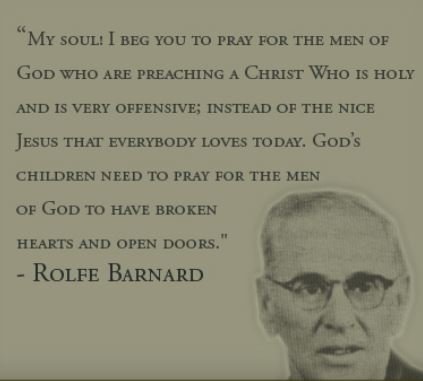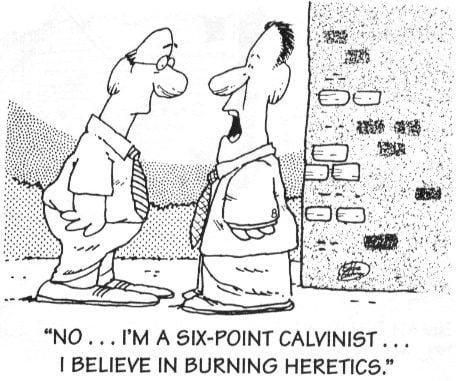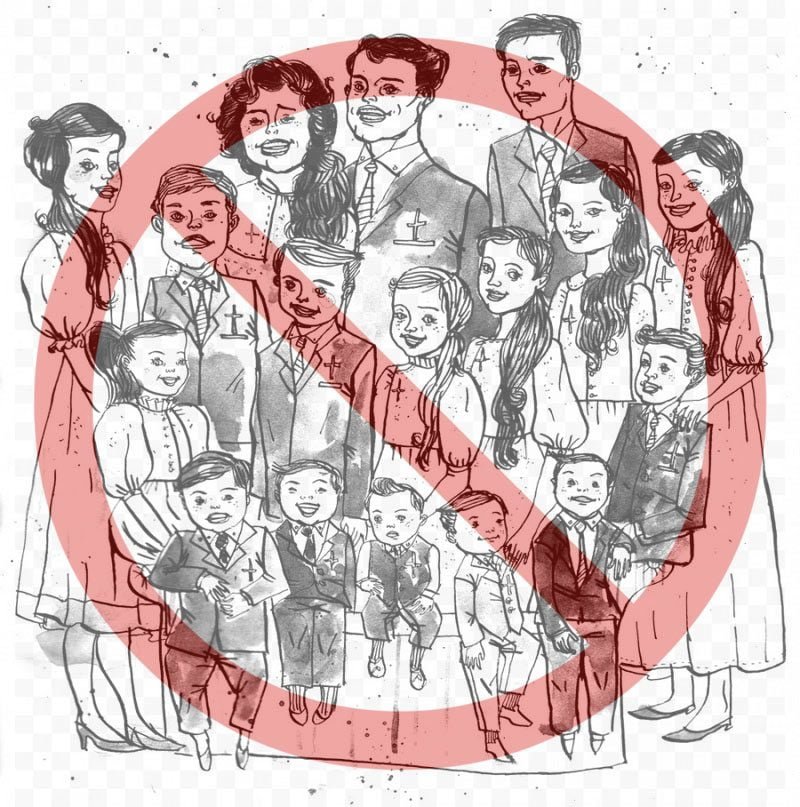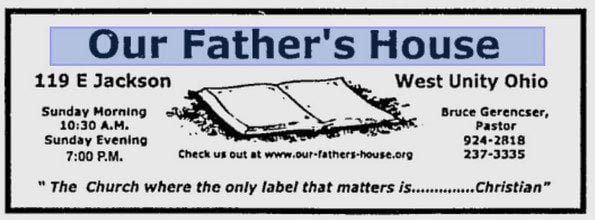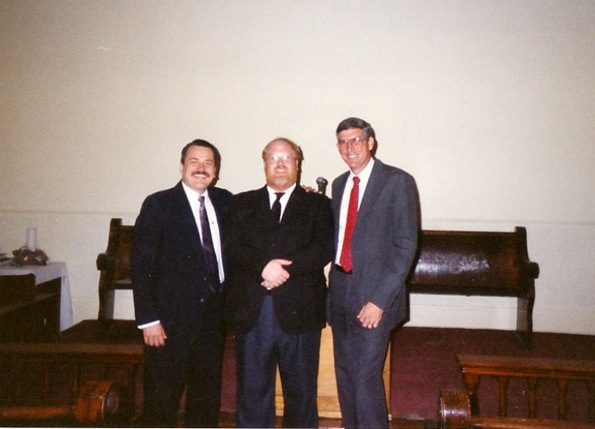
A regular reader of this blog asked if I would write about my move from Independent Fundamentalist Baptist (IFB) theology to Evangelical Calvinism. While I have mentioned the fact of my move to Calvinism, I have never explained why I did so.
I attended Midwestern Baptist College in Pontiac, Michigan from 1976-1979. Midwestern was a small IFB institution started in the 1950s by Dr. Tom Malone — the pastor of nearby megachurch Emmanuel Baptist Church — to train men for the ministry. While there were women enrolled for classes at Midwestern, seeking either to hook a preacher boy and become his wife or become a Christian school teacher, everything revolved around manufacturing new male soldiers for the IFB war machine.
In a post titled What is an IFB Church? I listed the following doctrinal distinctives:
- The inspiration, infallibility, and inerrancy of the Bible
- The sinfulness, depravity of man
- The deity of Christ
- The virgin birth of Christ
- The blood atonement of Christ for man’s sin
- The resurrection of Christ from the dead
- The second coming of Christ
- Separation from the world
- Salvation from sin is by and through Christ alone
- Personal responsibility to share the gospel with sinners
- Heaven and hell are literal places
- Hierarchical authority (God, Jesus, church, pastor, husband, wife)
- Autonomy and independence of the local church
While IFB churches and pastors are known for internecine wars over fine points of doctrine or whether certain behaviors are sinful, the aforementioned beliefs are nonnegotiable. Deny one or more of these doctrines and you will be labeled a compromiser, liberal, or a heretic.
Some churches don’t use the IFB moniker due to its negative associations; but using the doctrines listed above as the standard, many Southern Baptist congregations would be considered IFB churches. The same could be said for General Association of Regular Baptist Churches (GARBC) congregations. I should also add, in passing, that many Reformed Baptist, Sovereign Grace Baptist, Conservative Baptist, and Missionary Baptist churches have the same doctrinal markers as churches that proudly claim the IFB label. This means, then, that there are tens of millions of Americans who attend churches that hold to IFB theological beliefs, even if many of them refuse to label themselves as such.
Calvinism was considered heresy at Midwestern, and students found discussing Calvinism or promoting its tenets were expelled. My systematic theology teacher, Ronald Jones, made it clear that Calvinism was not to be discussed. Students weren’t taught anything about Calvinism, and most of them simply accepted the anathemas uttered by their teachers as fact. I know I did. Midwestern’s goal, then, was to reinforce the doctrines taught to students in their home churches. Rare were classroom discussions that veered from IFB orthodoxy. According to Tom Malone and the professors at Midwestern, there was One Lord (Jesus), one faith (IFB doctrine and practice), and one baptism (Baptist immersion). While these promoters of the one true faith grudgingly admitted it was possible for non-IFB Christians to be True Christians®, most outsiders were considered religious, but lost (especially Catholics, who were considered the spawn of Satan).
Midwestern was also King James Only. Students were not allowed to use any Bible version but the 1769 revision of the King James Bible. Midwestern also promoted the belief that a certain Greek translation, commonly called the Textus Receptus (received text), was the true Word of God in Greek, and all other translations, such as Wescott and Hort, were inferior and were not to be used in Midwestern’s Greek classes. One professor disobeyed this edict, introducing students to the wonderful world of textual variants. He was summarily fired, even though on every other point of theological and social Fundamentalism he was a true-blue Baptist Fundamentalist.
When I began pastoring IFB churches in 1979, I didn’t know one pastor who would have called himself a Calvinist. Today, Calvinism has made deep inroads in the IFB church movement and in the Southern Baptist Convention (SBC). In the SBC, Calvinistic pastors, led by men such as Al Mohler, are battling with non-Calvinistic pastors for the soul of the Convention.
For those of you who are unfamiliar with Calvinism, here’s the TULIP acronym for the five points:
- Total Depravity
- Unconditional Election
- Limited Atonement
- Irresistible Grace
- Perseverance of the Saints (Preservation of the Saints)
Calvinists also hold to what is commonly called the Five Solas:
- Sola Scriptura — By Scripture Alone
- Sola Fide — By Faith Alone
- Sola Gratia — By Grace Alone
- Solus Christus — Through Christ Alone
- Soli Deo Gloria — Glory to God Alone
Calvinism is a theological and philosophical system where each point builds upon the other. Remove any one point and the system collapses. As with any theological system, adherents endlessly debate the finer points of belief. There are numerous subsets of Calvinistic belief, each with peculiarities that set them apart from other Calvinists.
Calvinism is a complex theological system. I call it an intellectual’s wet dream. Calvinistic pastors line their bookshelves with wordy tomes written by seventeenth- and eighteenth-century Puritans and nineteenth-century Calvinistic Baptists and Presbyterians. IFB pastors have dick-measuring contests, with church attendance being the measure of success. Calvinists also have dick-measuring contests, with library size being the definitive proof of a pastor’s prowess.
Many of the Reformed and Sovereign Grace Baptist pastors I knew were, at one time, IFB pastors. All that changed for them was their soteriology and, at times, their ecclesiology. The same social Fundamentalism found in IFB churches is often found in Evangelical churches of Calvinistic persuasion. For many years, I would drive once a month to a Calvinistic pastor’s meeting called the Pastor’s Clinic in Mansfield, Ohio. Most of the men in this group were former IFB pastors — GARBC, SBC, and unaffiliated Baptist churches.
One big difference between Calvinistic Baptist churches and IFB churches is how the congregations handle church discipline. Typically, in IFB churches errant members are, behind the scenes, “encouraged” to leave so they can find a new church to better meet their “needs.” If this approach doesn’t work, pastors use their sermons, complete with subtle prods, to run the offender off. I don’t know of an IFB church that actually practices church discipline as laid out in Matthew 18:15-18:
Moreover if thy brother shall trespass against thee, go and tell him his fault between thee and him alone: if he shall hear thee, thou hast gained thy brother. But if he will not hear thee, then take with thee one or two more, that in the mouth of two or three witnesses every word may be established. And if he shall neglect to hear them, tell it unto the church: but if he neglect to hear the church, let him be unto thee as an heathen man and a publican. Verily I say unto you, Whatsoever ye shall bind on earth shall be bound in heaven: and whatsoever ye shall loose on earth shall be loosed in heaven.
On the other hand, Calvinistic Evangelical churches are much more likely to use church discipline to punish unrepentant members who run afoul of morality codes and conduct standards or disobey orders from their pastor/elders. Supposedly, the goal of church discipline is to effect restoration, but more often than not, it is used as Biblical cover for kicking people out of the church or shaming them into submission. One church I pastored, Community Baptist Church in Elmendorf, Texas, used church discipline for all sorts of offenses, including not regularly attending Sunday worship services. Even when the church was notified that the absent member was attending a new church, because the member didn’t ask the church’s “permission” to leave the church, he or she was excommunicated. The threat of church discipline was used to quash disagreement and keep congregants in line. (I was excommunicated from this church myself. You can read about my time at Community in the series titled, I am a Publican and a Heathen.)
My first exposure to Calvinism came in 1988 when I began borrowing and listening to cassette sermon tapes from Chapel Library — a Calvinistic tape lending library and tract publisher in Pensacola, Florida. I suppose, all told, that I listened to several hundred tapes. Before returning them, I would make copies of the tapes so other people in my church could listen to them. A year or so later, I started CHARIS Tape Library — a lending library patterned after Chapel Library. Tapes were sent free of charge to anyone who requested them. The goal was to spread the good news of the Calvinistic gospel — also known as the TRUE gospel, the faith once delivered to the saints.
In part two of this series, I will share how these tapes were instrumental in my theological move from IFB theology to Evangelical Calvinism.
Bruce Gerencser, 66, lives in rural Northwest Ohio with his wife of 45 years. He and his wife have six grown children and thirteen grandchildren. Bruce pastored Evangelical churches for twenty-five years in Ohio, Texas, and Michigan. Bruce left the ministry in 2005, and in 2008 he left Christianity. Bruce is now a humanist and an atheist.
Connect with me on social media:
Your comments are welcome and appreciated. All first-time comments are moderated. Please read the commenting rules before commenting.
You can email Bruce via the Contact Form.

